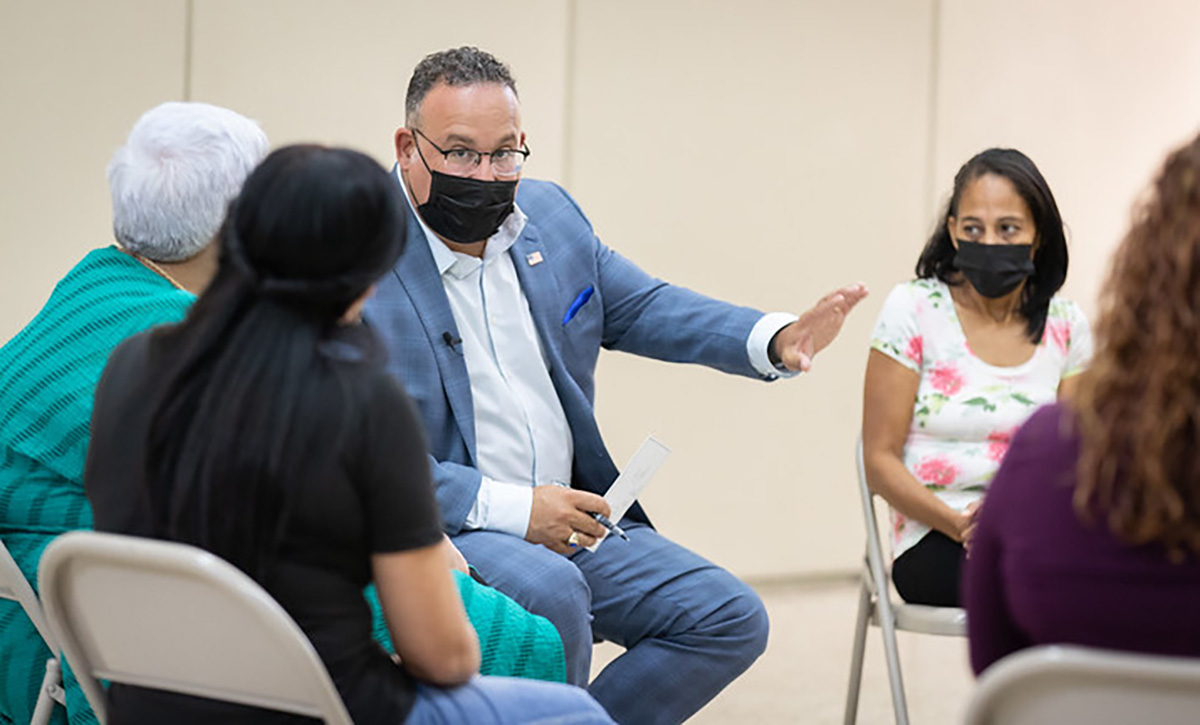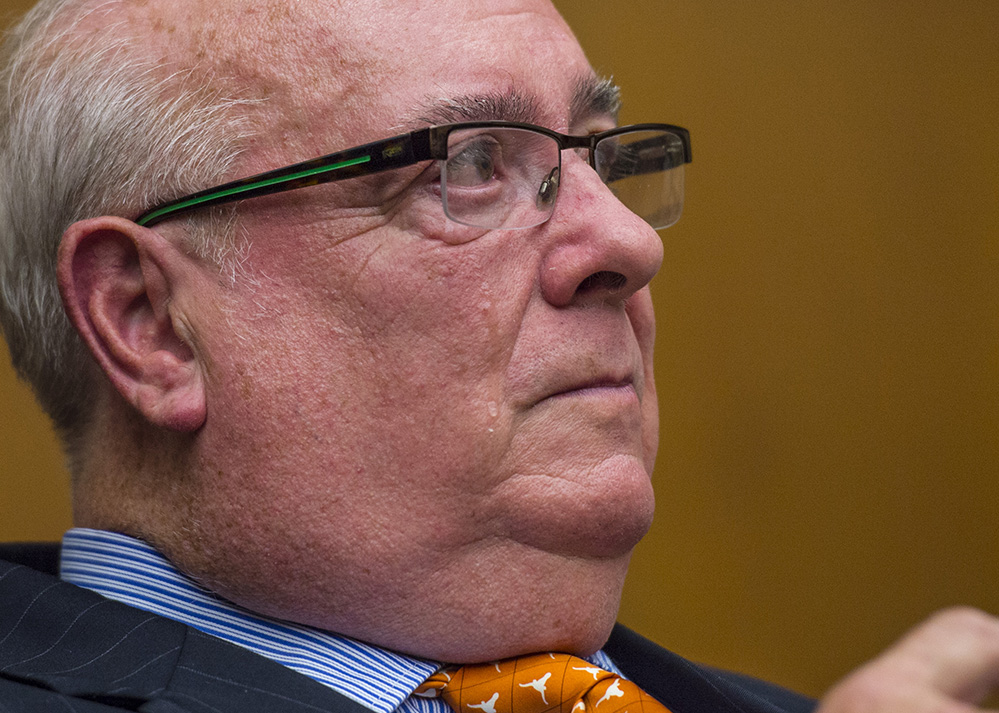Conservative Lawsuit Pushes Back Start of Ed Dept. Parent Council
The suit argues the department violated federal law, but in court Wednesday, the administration said the group is only a 'sounding board'

Get stories like this delivered straight to your inbox. Sign up for The 74 Newsletter
A recently established U.S. Department of Education parent council will not convene until long after school starts in most states due to a lawsuit challenging the group’s political makeup.
In federal court Wednesday, Chris Edelman, an attorney with the U.S. Department of Justice, said it would likely be mid-September before the National Parents and Families Engagement Council meets “to better understand how schools and students are coping as they adjust back to the classroom.”
And that’s only if Judge Royce Lamberth, of the U.S. District Court for the District of Columbia, allows the council to proceed without having to start from scratch.
On Wednesday, Lamberth denied the plaintiffs’ request to put an immediate stop to the council’s activities, promising to rule before the group meets on whether it violated federal law.

Under the law, there are three ways to establish a federal advisory committee — by statute, presidential order or through a federal agency. The agency involved has to place a notice in the Federal Register, appoint an administrator to the committee and establish a charter outlining the group’s purpose and how often it will meet. The department hasn’t taken those steps.
The department had planned to hold the first meeting with parent representatives this summer. Keri Rodrigues, president of the National Parents Union, one of the groups involved, expected it in July.
After issuing an initial press release, the department put up a second statement that included an email to get updates on the council’s work. The notice said the council “meets to discuss how children are recovering,” prompting the plaintiffs, three conservative organizations, to argue the department was violating the law. To this date, however, there have not been any meetings.
The lawsuit, filed July 6, argues that the council violated the law’s requirement that groups giving agencies input on potential rules or legislation be “fairly balanced.” Cardona, they contend, chose organizations that would fall in line with the department’s agenda.
“The department chose organizations … based on their ability to develop camaraderie so that they would give good advice as a group,” said Christopher Mills, an attorney for the plaintiffs — the America First Legal Foundation, a conservative nonprofit led by former Trump administration officials, Fight for Schools and Families, a political action committee in Loudoun County, Virginia, and Parents Defending Education, a watchdog group opposed to teaching and curriculum focused on race and gender.
But Edelman countered that the group will function more as a “sounding board” for the department, that membership will change over time and that the council won’t weigh in on specific policy.
In the initial announcement, Cardona described the council as an effort to ensure students “have the academic and mental health support they need to recover from the pandemic and thrive in the future.” For Cardona, who initially faced criticism for making public comments that emphasized the pandemic’s burden on educators, the council offers a chance for parents to have a more visible role as the department attempts to rebuild trust between schools and families.
“To have the leadership of the secretary’s office leaning in with good intentions is … an epic win for all parents across the country,” said Ashara Baker, a mother of a first grader at a Rochester, New York, charter school who was appointed to the council by the National Parents Union. As far as getting the group started, she said, “The sooner the better.”
She called the lawsuit “a distraction.”
Other committees challenged
The department currently has seven advisory committees, according to its website, including the President’s Advisory Commission on Hispanic Prosperity and the President’s Board of Advisors on Historically Black Colleges and Universities. Tuesday’s Federal Register, for example, included a meeting announcement for the National Advisory Council on Indian Education.
Education officials aren’t the only members of the Biden administration who have faced challenges related to advisory committee membership. A former member of an Environmental Protection Agency committee sued last fall, arguing that the agency removed industry representatives in an attempt to “sideline anyone who might dissent from the president’s climate-change agenda.” They argued that the committee wasn’t “fairly balanced” as the law requires.
In March, a district court judge denied the plaintiff’s request to stop the committee from meeting.
The Trump administration, however, had to disband a wildlife conservation committee after a federal judge sided with an environmental advocacy group in a 2018 lawsuit. The plaintiffs argued that potential profiteers from the import of hides, heads and tusks from Africa stacked the committee.
The makeup of the education department’s parent council is a key focus of the current lawsuit. Erika Sanzi, director of outreach for Parents Defending Education, expressed harsh criticism, calling the chosen groups “Biden fans” who are “glaringly out-of-step with the majority of frustrated parents who have been showing up in huge numbers to school board meetings across red and blue America.”
Sanzi and Rodrigues have clashed on Twitter over the Department of Justice’s warning last fall about harassment and threats of violence against school officials and board members.
It’s unclear whether Parents Defending Education or Fight for Schools and Families wants to be part of the parent council. Sanzi told The 74 in an email that she didn’t think the group would address any parent concerns over curriculum.
But the groups on the list — including Fathers Incorporated, the League of United Latin American Citizens and the National Military Family Association — won’t necessarily determine what the parents have to say, said Patience Peabody, executive director of the Flamboyan Foundation, which supports family engagement efforts, especially in the District of Columbia schools.
“The member organizations are among the many voices. They are the facilitators. They are bringing the real stories and voices to the table,” she said, adding that the council “only works if that happens.”
Baker, for example, is a charter school parent, but said a lot of families have children in both charter and traditional schools. After remote learning, she said her daughter is still “struggling with letters” and hasn’t begun to recognize entire words. Her charter school didn’t provide tutoring, so she paid for it herself.
“Whether it’s a charter, or district or private school,” she said, “we’re all doing our best and doing what’s going to get our kids across the finish line.”
Get stories like these delivered straight to your inbox. Sign up for The 74 Newsletter

;)
